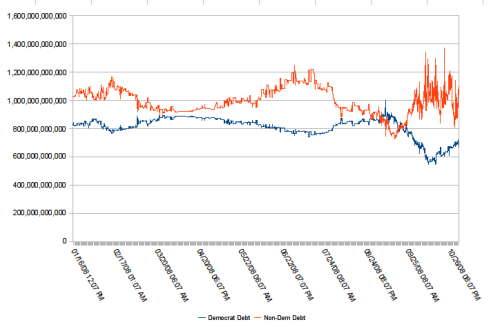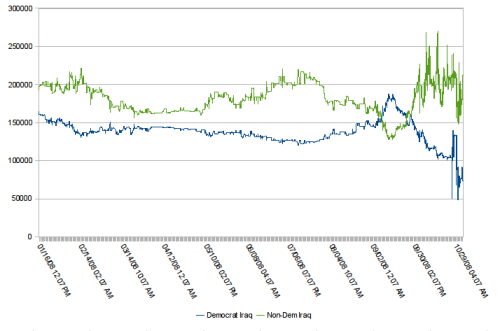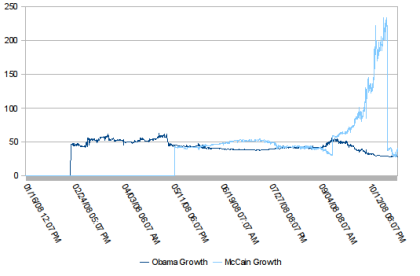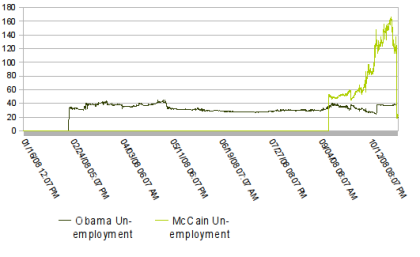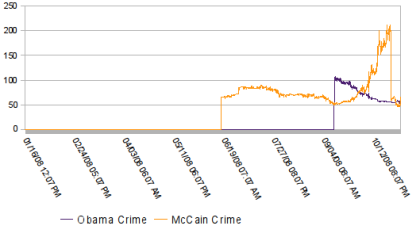December 16 marked six years since the release of the first Creative Commons licenses. Most of the celebrations around the world have already taken place or are going on right now, though San Francisco’s is on December 18. (For CC history before 2002-12-16, see video of a panel recorded a few days ago featuring two of CC’s founding board members and first executive director or read the book Viral Spiral, available early next year, though my favorite is this email.)
I’ve worked for CC since April, 2003, though as I say in the header of this blog, I don’t represent any organization here. However, I will use this space to ask for your support of my and others’ work at CC. We’re nearing the end of our fourth annual fall public fundraising campaign and about halfway to our goal of raising US$500,000. We really need your support — past campaigns have closed out with large corporate contributions, though one has to be less optimistic about those given the financial meltdown and widespread cutbacks. Over the longer term we need to steadily decrease reliance on large grants from visionary foundations, which still contribute the majority of our funding.
Sadly I have nothing to satisfy a futarchist donor, but take my sticking around as a small indicator that investing in Creative Commons is a highly leveraged way to create a good future. A few concrete examples follow.
RDFa became a W3C Recommendation on October 14, the culmination of a 4+ year effort to integrate the Semantic Web and the Web that everyone uses. There were several important contributors, but I’m certain that it would have taken much longer (possibly never) or produced a much less useful result without CC’s leadership (our motivation was first to describe CC-licensed works on the web, but we’re also now using RDFa as infrastructure for building decoupled web applications and as part of a strategy to make all scientific research available and queryable as a giant database). For a pop version (barely mentioning any specific technology) of why making the web semantic is significant, watch Kevin Kelly on the next 5,000 days of the web.
Wikipedia seems to be on a path to migrating to using the CC BY-SA license, clearing up a major legal interoperability problem resulting from Wikipedia starting before CC launched, when there was no really appropriate license for the project. The GNU FDL, which is now Wikipedia’s (and most other Wikimedia Foundation Projects’) primary license, and CC BY-SA are both copyleft licenses (altered works must be published under the same copyleft license, except when not restricted by copyright), and incompatible widely used copyleft licenses are kryptonite to the efficacy of copyleft. If this migration happens, it will increase the impact of Wikipedia, Creative Commons, free culture, and the larger movement for free-as-in-freedom on the world and on each other, all for the good. While this has basically been a six year effort on the part of CC, FSF, and the Wikimedia Foundation, there’s a good chance that without CC, a worse (fragmented, at least) copyleft landscape for creative works would result. Perhaps not so coincidentally, I like to point out that since CC launched, there has been negative license proliferation in the creative works space, the opposite of the case in the software world.
Retroactive copyright extension cripples the public domain, but there are relatively unexplored options for increasing the effective size of the public domain — instruments to increase certainty and findability of works in the public domain, to enable works not in the public domain to be effectively as close as possible, and to keep facts in the public domain. CC is pursuing all three projects, worldwide. I don’t think any other organization is placed to tackle all of these thorny problems comprehensively. The public domain is not only tremendously important for culture and science, but the only aesthetically pleasing concept in the realm of intellectual protectionism (because it isn’t) — sorry, copyleft and other public licensing concepts are just necessary hacks. (I already said I’m giving my opinion here, right?)
CC is doing much more, but the above are a few examples where it is fairly easy to see its delta. CC’s Science Commons and ccLearn divisions provide several more.
I would see CC as a wild success if all it ever accomplished was to provide a counterexample to be used by those who fight against efforts to cripple digital technologies in the interest of protecting ice delivery jobs, because such crippling harms science and education (against these massive drivers of human improvement, it’s hard to care about marginal cultural production at all), but I think we’re on the way to accomplishing much more, which is rather amazing.
More abstractly, I think the role of creating “commons” (what CC does and free/open source software are examples) in nudging the future in a good direction (both discouraging bad outcomes and encouraging good ones) is horribly underappreciated. There are a bunch of angles to explore this from, a few of which I’ve sketched.
While CC has some pretty compelling and visible accomplishments, my guess is that most of the direct benefits of its projects (legal, technical, and otherwise) may be thought of in terms of lowering transaction costs. My guess is those benefits are huge, but almost never perceived. So it would be smart and good to engage in a visible transaction — contribute to CC’s annual fundraising campaign.
